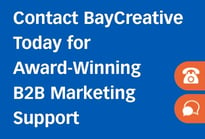We know 93% of B2B buyers find case studies and testimonials important when evaluating potential solutions. So loading up your website with case studies that target different segments of your prospect base makes good B2B marketing sense.
But you don’t have to just park your case studies on your website and wait for them to be discovered by prospects who are researching for a solution like yours. By being proactive with marketing your case studies, you can get more bang for your buck.
How To Utilize Your B2B Case Studies
Here are 8 ways you can use your case study to give it greater reach:
- Because of their applicability to specific buyer types, case studies make great resources for your sales team. These success stories give them personalized content to show prospects, making their pitch more relevant to those prospects.
- Condense the case study down into a PowerPoint (or similar) slide for quick viewing at a sales presentation. Because it’s coming from a credible source, this can be very powerful during a presentation about what your product can do for the prospect. This is a proof point that can help close the deal.
- Use them as handouts at industry events, speaking engagements, or webinars.
- Make each new case study part of your email marketing campaign, sending out a brief message highlighting the newest customer you’ve helped, with a link to the case study’s landing page.
- Have your sales staff put a (tracked) link in or under their email signature—but rather than the name of the case study, have them draw out the one big benefit the case study illustrates. For example, “Learn how ABC saved $2 million a year with our solution.”
- Pull out the meaty customer quotes and strategically use them on your website. Landing pages are a good place for those. Even better if you can use the client’s name and logo.
- And use those quotes on social media, with a link to the case study’s landing page.
- Turn the case study into a blog post. Expand on it, if possible, perhaps by bringing in someone from your organization to tell the story from their view. Or outline best practice tips learned from the client experiences. Talk about what your client learned during the process; the things the client considered before selecting a solution; and what they would recommend others know before starting the process.
Telling the Story Isn’t the End of the Story
Case studies are a powerful part of any B2B marketing campaign. But the creation of that document isn’t the end of your time with that story. Find other avenues in which to present it so that you get extra mileage out of this compelling piece.
Are you ready to brag about your product/solution a bit, but don’t feel like you have the internal resources or expertise? BayCreative, a full-service B2B marketing firm, can help. We have our own success stories in helping numerous companies tell their success stories.
... and we’d love to help you, too.
All the best,
- Team BayCreative -


